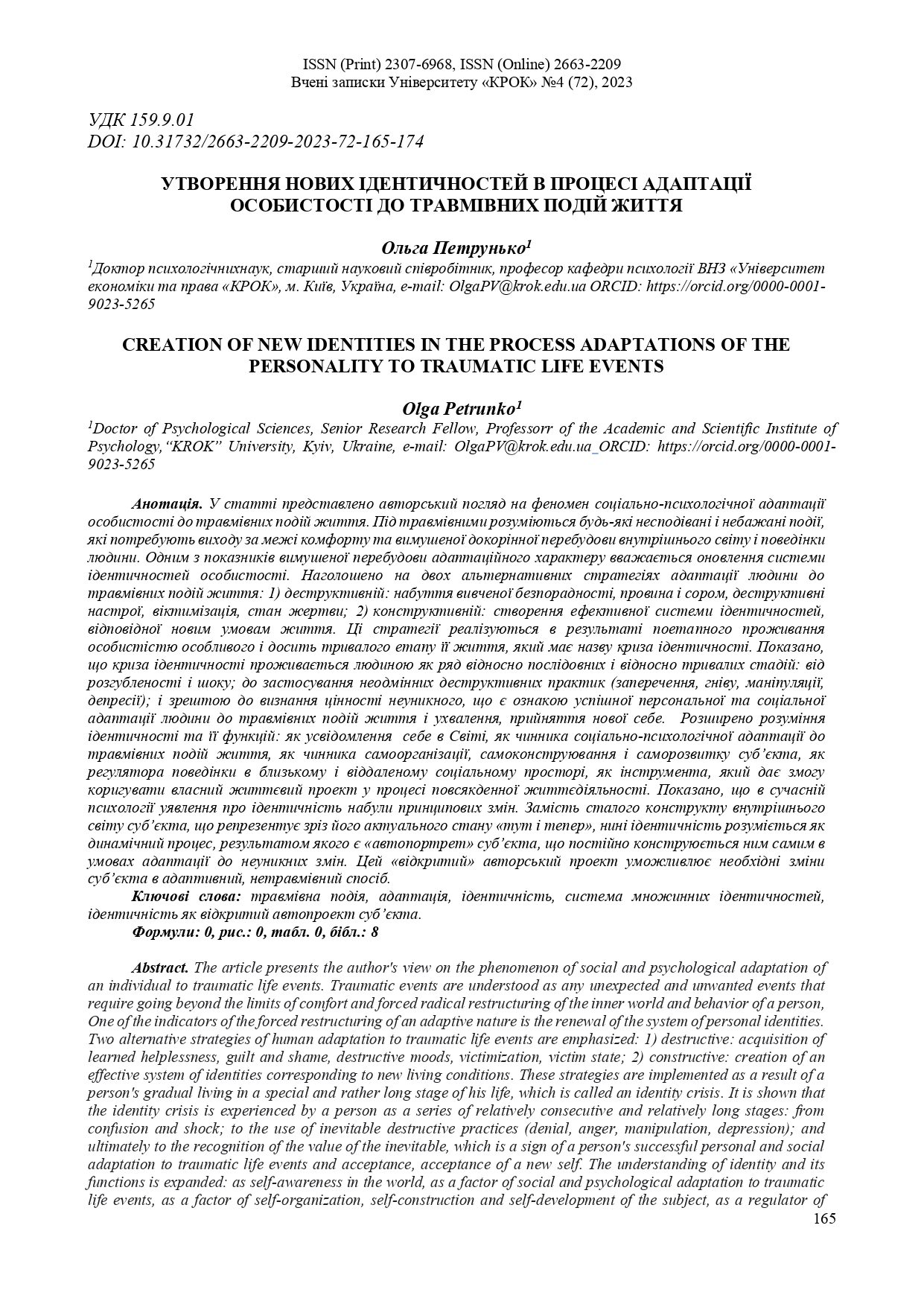CREATION OF NEW IDENTITIES IN THE PROCESS ADAPTATIONS OF THE PERSONALITY TO TRAUMATIC LIFE EVENTS
DOI:
https://doi.org/10.31732/2663-2209-2023-72-165-174Keywords:
traumatic event, adaptation, identity, system of multiple identities, identity as an open self-project of the subjectAbstract
The article presents the author's view on the phenomenon of social and psychological adaptation of an individual to traumatic life events. Traumatic events are understood as any unexpected and unwanted events that require going beyond the limits of comfort and forced radical restructuring of the inner world and behavior of a person, One of the indicators of the forced restructuring of an adaptive nature is the renewal of the system of personal identities. Two alternative strategies of human adaptation to traumatic life events are emphasized: 1) destructive: acquisition of learned helplessness, guilt and shame, destructive moods, victimization, victim state; 2) constructive: creation of an effective system of identities corresponding to new living conditions. These strategies are implemented as a result of a person's gradual living in a special and rather long stage of his life, which is called an identity crisis. It is shown that the identity crisis is experienced by a person as a series of relatively consecutive and relatively long stages: from confusion and shock; to the use of inevitable destructive practices (denial, anger, manipulation, depression); and ultimately to the recognition of the value of the inevitable, which is a sign of a person's successful personal and social adaptation to traumatic life events and acceptance, acceptance of a new self. The understanding of identity and its functions is expanded: as self-awareness in the world, as a factor of social and psychological adaptation to traumatic life events, as a factor of self-organization, self-construction and self-development of the subject, as a regulator of behavior in the near and distant social space, as a tool that gives be able to adjust one's own life project in the course of daily life activities. It is shown that in modern psychology ideas about identity have undergone fundamental changes. Instead of a stable construct of the subject's inner world, which represents a slice of his actual state «here and now», today identity is understood as a dynamic process, the result of which is a «self-portrait» of the subject, which is constantly constructed by him in the conditions of adaptation to inevitable changes. This «open» author project enables the necessary changes of the subject in an adaptive, non-traumatic way.
Downloads
References
Артемов, В., & Сингаївська, І. (2022) Особливості процесів прийняття рішень в умовах невизначеності. Вчені записки Університету «КРОК», 1 (65). С. 149–163.
Острова В. Д. Особливості соціальної ідентичності сучасної студентської молоді //Актуальні проблеми психології: зб. наук. праць Ін-ту психології ім. Г. С. Костюка АПН України/за ред. С. Д. Максименка. К.: Логос, 2006. Т. 7, Вип. 8. С. 363–370.
Erikson E. IDENTITY youth and crisis. New York : W. W. Norton & Company, 1968. 344 p.
Pliushch A.N. (2023). Understanding Identity in the Context of Cultural-Historical Psychology. Journal of the Higher School of Economics. Vol. 20. № 2. P. 338–353.
Яблонська Т.М. (2010). Ідентичність як предмет психологічного аналізу. Наукові записки Інституту психології ім.Г.С.Костюка НАПН України /за ред. акад. С.Д.Максименка. К.: Ніка-Центр. Вип. 38. С. 378–387.
Петрунько О.В, Паціора Г.М. (2023). Особливості віктимної поведінки молоді. Вчені записки Університету «КРОК». №2 (70). С. 159–165.
Кюблер-Росс Е. Про життя та смерть : Пер. з англ. М.: Софія, 2001. 294 с.
Злобіна О.Г. Особистість як суб’єкт соціальних змін. К. :IС НАНУ, 2004. 400 с.

Downloads
Published
How to Cite
Issue
Section
License

This work is licensed under a Creative Commons Attribution-NonCommercial 4.0 International License.

